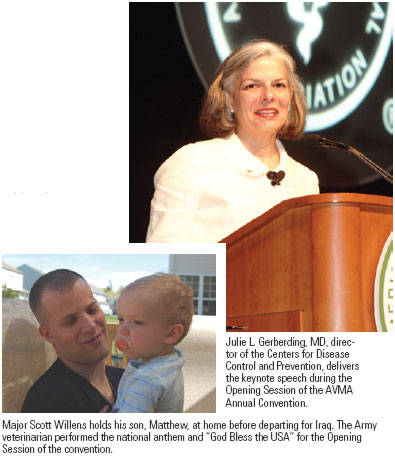Opening Session illustrates global health interconnections
The Opening Session of the AVMA Annual Convention, with sponsorship from Hill's Pet Nutrition Inc., started with a display of national pride and concluded with a message of global health from the director of the Centers for Disease Control and Prevention.

The surgeon general's honor cadre began the ceremony by presenting the flag. Then the audience turned to the ballroom screens for a recording of Major Scott Willens (MIN '96), an Army veterinarian overseas in Iraq, singing the "The Star-Spangled Banner" while holding his son.
Later, via a live satellite link, Dr. Willens gave a moving rendition of "God Bless the USA." He said a few words to recognize the work of his military colleagues. He also greeted members of his family who were in the audience in Washington, D.C.
"Thank you all for yesterday's highest honor," Dr. Willens wrote to AVMA the next day. "The AVMA convention was great public relations for the 4th Brigade Combat Team (Airborne), 25th Infantry Division, at Kalsu; the North Babil Embedded Provincial Reconstruction Team; the Army Veterinary Corps; and Operation Iraqi Freedom. It was also a great honor for my family and a day they will never forget. They deserve it for all the support they have given me. And for the folks attending the conference, it represented all the service members in theater and their families. Enjoy the conference; sorry I could not be there."
Dr. Roger K. Mahr, 2006-2007 president of the AVMA, presented the 2007 AVMA Award to Dr. William McEniry during the Opening Session. Other veterinarians also received awards. Complete coverage of these honors will follow in the Sept. 15 issue of the JAVMA.
After the award presentations, the CDC director delivered her keynote speech. Julie L. Gerberding, MD, said she grew up across the street from a veterinarian. She baby-sat his kids, and he treated the sick animals that she brought to him. He also taught her about good bedside manner.
Dr. Gerberding went on to paint a picture of the current system for health care. The CDC is responsible for urgent threats, she said, and the problems are getting bigger. The U.S. population faces challenges of age, weight, and disease. The world faces challenges of poverty, global warming, and conflict.
"We're dealing in a world that has very high expectations," Dr. Gerberding said.
People expect flawless performance and complete transparency, and the CDC must deliver information at the speed of the Internet. The health care system competes for resources with other government priorities.
"When you're trying to be cheaper, better, faster, you're putting a system under enormous pressure," Dr. Gerberding said.
Solutions include technology, prevention, and preparedness. People need information about how to spend health dollars wisely, and the links need to be stronger between programs for public health and programs for delivering health care.
The CDC must work with the AVMA, Dr. Gerberding said, to improve the health of humans and animals. She noted the interactions between human and animal health in food safety and in the relationship between people and animals.
Since 2001, Dr. Gerberding added, many of the CDC's challenges have been zoonotic diseases—including anthrax, monkeypox, SARS, and avian influenza. In fact, most recent emerging diseases have been zoonotic. Many of these challenges are global.
Dr. Gerberding said the CDC looks at the three dimensions of human, animal, and ecology health.
"We have many veterinarians at the CDC," Dr. Gerberding said. "Their work is all over our organization."
The CDC and other agencies need more veterinarians, though. The CDC is trying to strengthen veterinary training and recruitment.
The CDC also is creating public outreach programs relevant to animal health and building multidisciplinary networks of health professionals around the world.
Dr. Gerberding concluded by saying veterinarians and physicians must present a seamless front to protect human and animal health in a small world.